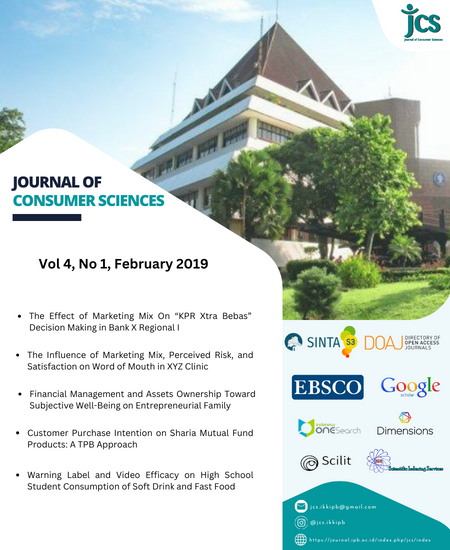Customer Purchase Intention on Sharia Mutual Fund Products: A TPB Approach
Abstract
This study aimed to determine the influence of variables in TPB (attitude toward behavior, perceived behavioral control, subjective norm), religiosity, knowledge, and risk perception to intention purchase of sharia mutual fund. The sample in this study was customer of Bank Sharia XYZ of 164 customers. The analysis applied in this study was Structural Equation Modeling-Partial Least Square. The result of this research showed that the independent variable had positive and significant influence to dependent variables attitude toward behavior and subjective norm. Religiosity and knowledge have no significant influence toward intention to purchase, while perceived behavioral control and risk perception had no significant influence with intention to purchases. The other result showed that religiosity had a positive significant influence to attitude toward behavior. The conclusion of this research shown that religiosity is the factor which influence attitude toward behavior, attitude toward behavior and subjective norm are the factors which influence intention purchase of sharia mutual fund.
References
Youssef, A. M. M. H., Kortam, W., Abou-Aish, E., Bassiouny, N. E. (2015). Effect of religiosity on consumer attitudes toward islamic banking in Egypt. International Journal of Bank Marketing, 33(6), 786-807.
Ajzen, I. (2015). Consumer attitudes and behavior: The theory of planned behavior applied to food consumption decisions. Rivista di Economia Agraria, 2, 121-138.
Alam, S. S., Sayuti, N. M. (2011). Applying the theory of planned behavior (TPB) in halal food purchasing. International Journal of Commerce and Management, 21(1), 8-20. doi:10.1108/10569211111111676.
Amelia, R. (2017). Analisis kepemilikan perencanaan keuangan hari tua pada tenaga kerja di Kota Bogor (master thesis). Bogor Agricultural University, Bogor.
Amin, H., Rahim, A., Sondoh, S. L., Ang, M. C. H.(2011). Determinants of customers intention to use islamic personal financing: The case of Malaysian islamic banks. Journal of Islamic Accounting and Business Research, 2(1), 22-42.
Ashoer, M. (2016). The impact of perceived risk on consumer purchase intention in Indonesia; a social commerce study. Proceeding of the International Conference on Accounting, Management, Economics and Social Sciences.
Beik, I. S. (2011). Memperkuat peran suku negara dalam pembangunan ekonomi Indonesia. Jurnal Ekonomi Islam Al-Infaq, 2(2), 65-72.
Cuccinelli, D., Gandolfi, G., Soana, M. G. (2016). Customer and advisor financial decisions: The theory of planned behavior perspective. International Journal of Business and Social Science, 7(12), 80-92.
Fabrigar, L. R., Smith, S. M., Petty, R. E., Crites, S. L. (2006). Understanding knowledge effects on attitude-behavior consistency: The role of relevance, complexity, and amount of knowledge. Journal of Personality and Social Psychology, 90(4), 556-77.
Firmandhani. (2016). Faktor-faktor yang mempengaruhi niat masyarakat mikro dalam membeli produk asuransi mikro syariah (Master thesis). Bogor Agricultural University, Bogor.
Hair, J. F., Black, W. C., Babin, B. J., Anderson, R. E. (2010). Multivariate data analysis, seventh edition. New Jersey: Pearson Prentice Hall.
Haekal, A., Widjajanta, B. (2016). Pengaruh kepercayaan dan persepsi risiko terhadap minat membeli secara online pada pengunjung website classifieds di Indonesia, 1(1),181-193
Hartoyo., Astuti., Nindia, R. (2013). Pengaruh nilai, tingkat pengetahuan, dan sikap terhadap perencanaan keuangan hari tua. Jurnal Ilmu dan Keluarga Konsumen, 6(2), 109-118.
Islamoglu, M., Apan, M., Ayvali, A. (2015). Determination of factors affecting individual investor behaviours: A study on bankers. International Journal Of Economics And Financial Issues, 5(2), 531-543.
Lestari, B. A., Suharjo, B., Muflikhati, I. (2017). Minat kepemilikan kartu kredit (Studi kasus Kota Bogor). Jurnal Aplikasi Bisnis dan Manajemen, 3(1), 143-151.
Njuguna, P. K. (2017). Determinants of investment intentions of individual retail stock market investors on the nairobi securities Exchange in Kenya (Undergraduate thesis). Jomo Kenyatta University of Agricultural and Technology, Kenya.
Nugroho, A., Najib, M., Simanjuntak. (2018). Factors Affecting Consumer Interest In Electronic Money Usage With Theory of Planned Behavior (TPB). Journal of Consumer Sciences. 3(1):15-27. http://dx.doi.org/10.29244/jcs.3.1.15-27. http://journal.ipb.ac.id/index.php/jcs/article/view/20407
Rosyidah, S. M., Lestari, W. (2013). Religiusitas dan persepsi risiko dalam pengambilan keputusan investasi pada perspektif gender. Journal of Business and Banking,3(2), 189-200.
Seba, I., Rowley, J., Lambert, S. (2012). Factors affecting attitudes and intentions toward knowledge sharing in the Dubai police force. International Journal of Information Management, 32(4), 372-380.
Shabrina, Z., Yuliati, L. N., Simanjuntak, M. (2018). The effect of religiosity, pricing and corporate image on the attitude and the intention to use sharia micro financing. Indonesian Journal of Business and Entrepreneurship, 4(2), 197-206. http://journal.ipb.ac.id/index.php/ijbe/article/view/21339
Sujiwo, P. (2015). Analisis sikap konsumen muslim terhadap asuransi jiwa syariah (Master thesis). Bogor Agricultural University, Bogor.
Sumarwan, U. (2014). Perilaku konsumen teori dan penerapannya dalam pemasaran. Bogor: Ghalia Indonesia.
Trang, P. T. M., Tho, N. H. (2017). Perceived risk, investment performance and intentions in emerging stock markets. International Journal of Economics and Financial Issues, 7(1), 269-278.
Wijanto, S. H. (2008). Structural equation modelling (SEM) dengan LISREL 8.8. Yogyakarta: Graha Ilmu.
Yulianti, N., Silvy, M. (2013). Sikap pengelola keuangan dan perilaku perencanaan investasi keluarga di Surabaya. Journal of Business And Banking, 3(1), 57-68.
Authors
Authors who publish with this journal agree to the following terms:
- Authors retain copyright and grant the journal right of first publication with the work simultaneously licensed under a

This work is licensed under a Creative Commons Attribution 4.0 International License. that allows others to share the work with an acknowledgement of the work's authorship and initial publication in this journal. - Authors are able to enter into separate, additional contractual arrangements for the non-exclusive distribution of the journal's published version of the work (e.g., post it to an institutional repository or publish it in a book), with an acknowledgement of its initial publication in this journal.
- Authors are permitted and encouraged to post their work online (e.g., in institutional repositories or on their website) prior to and during the submission process, as it can lead to productive exchanges, as well as earlier and greater citation of published work (See The Effect of Open Access).







